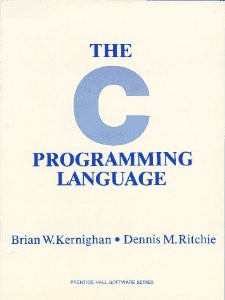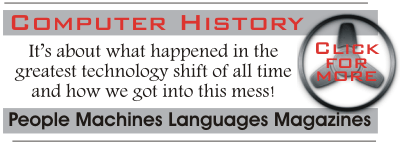| The Rise Of People Power - Computer Languages in the 1970's |
| Written by Harry Fairhead | |||||||
Page 3 of 3
The C alternativeWhile all of the BASIC/Pascal violence was going on there was an infiltrator preparing to enter the battle. In the early seventies the Bell Labs was remarkably productive in the area of practical computing. This was the birthplace of the Unix operating system and the C computer language. One of the drawbacks of all of the existing popular programing languages was that for many applications they were too high-level. For example, if you wanted to write an operating system you needed to deal with many low-level features of the hardware directly and this is exactly what a high-level language is designed to stop you from doing. As a result the Cambridge University Mathematical Laboratory and the University of London Computer Unit created a new language for systems programming - Combined Programming Language or CPL. The only problem with CPL was that it was too large for many applications and so a variant BCPL (Basic CPL) was derived by Martin Richards at Cambridge. BCPL was moderately successful but only in small groups and mainly in the UK. The fame of BCPL spread sufficiently to reach the other side of the Atlantic where Ken Thompson at the Bell Labs produced an even smaller version of CPL than BCPL and called it B. At the time the Bell group were working on Unix in assembler and B was intended to be the language they used for the rest of the development.
Dennis Ritchie reworked some of Thompson's ideas to produce the language C, as in the language that comes after B! C is a language that combines low-level features with the sort of structure that you find in Algol. Indeed, it is reasonable to call C a structured assembly language. Almost as proof that C was a powerful language, the bulk of Unix, all apart from a small assembly language kernel, was rewritten in C. At first the success of C and Unix went hand in hand and C was thought of by many as the systems programming language for Unix. However, its fame spread and it eventually turned up under other operating systems and started to produce a reputation for itself as a general-purpose language. Even so it is more accurate to see C as a seed that was planted in the 70s to grow in importance in the 80s. In that decade C became the language of the software professional, but it would have been difficult to guess at this role at its inception.
Of the three languages discussed here, C is the survivor. The famous K&R book pictured above saw a second edition for ANSI C in 1988. Not only is it still in print, there is now a Kidnle edition It has found a new role as the language of the Internet of Things. Perhaps for its popularity in this context it was the TIOBE Language of the Year for 2020 and currently (December 2020) is the number one language in the Tiobe Index. Other languages in the 70sFor Fortran and Cobol the 70s were a time for revision. Fortran added structured statements borrowed from Algol to produce Fortran 77. Cobol however was more static and only submitted to slight revision in 74. For Algol the decade was a bad one because it was almost completely wiped out by its offspring Pascal. The popularity of the personal computer and the perceived inadequacies of BASIC sent people in search of the ideal language. This was a time of enthusiasm, some might say more enthusiasm than knowledge. Less common languages such as Forth and APL were dragged up and their virtues extolled. Well-known languages such as BASIC were modified into languages such as COMAL. There were even personal computer implementations of Fortran 66! In the main, however, the decade belonged to BASIC even though the academics would have it belong to Pascal. For the development of other computer languages see the rest this series covering the 1950s and onwards:
Related ArticlesKemeny & Kurtz, inventors of BASIC Bill Gates - Before he was famous C Is Number One Language Again Shock Horror - C Is The TIOBE Language Of The Year! To be informed about new articles on I Programmer, sign up for our weekly newsletter, subscribe to the RSS feed and follow us on Twitter, Facebook or Linkedin.
|
|||||||
| Last Updated ( Thursday, 31 December 2020 ) |

 Kenneth Thompson & Dennis Ritchie
Kenneth Thompson & Dennis Ritchie 
